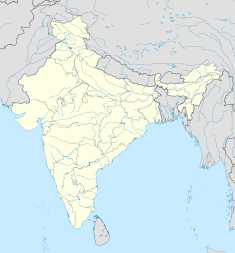Bomanjee Hormarjee Wadia Clock Tower
| Bomanjee Hormarjee Wadia Clock Tower | |
|---|---|
 | |
| Location | Perin Nariman Street |
| Coordinates | 18°56′04″N 72°50′09″E / 18.934320°N 72.835840°E |
| Area | Fort, Mumbai |
| Built | 1882 |
| Architectural style(s) | Persian architecture |
Bomanjee Hormarjee Wadia Clock Tower is a heritage structure in Fort, Mumbai, India, that was erected in 1882 using public funds as a token of appreciation for Bomanjee Hormarjee Wadi, a Parsi philanthropist who had contributed to the cause of education in the city.[1] He was a member of the Bombay Native Education Society and on the board of Elphinstone Institution (now Elphinstone College).[2] He died on 3 July 1862.[3]
The building had a functional drinking fountain, and the facade has many elements of Persian architecture, like lamassus at every entrance, and ornate acanthus leaf cornices.[4][5] The structure was in extremely poor condition and was repeatedly vandalised (the glass and hands from clock face were often stolen), but it was restored by a team led by conservation architect Vikas Dilawari, with funding from the Kala Ghoda Association, in 2017.[3][6] The restoration project on the tower won the Honourable Mention under the UNESCO Asia-Pacific Awards for Cultural Heritage Conservation.[7]
References
[edit]- ^ Venkatraman, Tanushree (15 March 2016). "Wadia Clock Tower to be restored". Hindustan Times. Archived from the original on 22 November 2022. Retrieved 21 June 2022.
- ^ Palsetia, Jesse S. (1 January 2001). The Parsis of India: Preservation of Identity in Bombay City. BRILL. ISBN 9004121145 – via Google Books.
- ^ a b "How safe is Mumbai's heritage from wrecking?". mid-day. 29 January 2016. Archived from the original on 30 June 2020. Retrieved 30 June 2020.
- ^ "VDA- Projects". Archived from the original on 13 July 2020. Retrieved 30 June 2020.
- ^ Fernando, Benita (19 July 2019). "Breathing life back into Mumbai's fountains". Livemint. Archived from the original on 30 June 2020. Retrieved 30 June 2020.
- ^ "Two South Mumbai heritage structures in shambles brought back to life". 6 January 2017. Archived from the original on 30 June 2020. Retrieved 30 June 2020.
- ^ "Painstaking work restores Mumbai's structures to former glory". The Indian Express. 3 November 2017. Archived from the original on 22 November 2022. Retrieved 21 June 2022.


